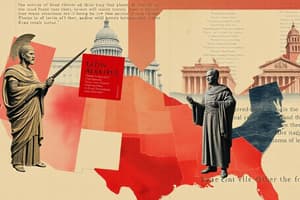Podcast
Questions and Answers
What was the main reason for the success of Ancient Rome?
What was the main reason for the success of Ancient Rome?
- Power, influence, and longevity (correct)
- Rome's control over most of Europe
- Being the largest empire in history
- Its advanced military technology
Which social classes made up Roman society?
Which social classes made up Roman society?
- Plebeians and Foreigners
- Senators and Consuls
- Patricians and Warriors
- Patricians and Plebeians (correct)
What role did the Senate play in Roman government?
What role did the Senate play in Roman government?
- Religious ceremonies
- Judicial decisions
- Military command
- Managing treasury and advising consuls (correct)
Who were responsible for public morality in Roman society?
Who were responsible for public morality in Roman society?
What governmental system led to a period of peace and stability known as Pax Romana?
What governmental system led to a period of peace and stability known as Pax Romana?
How did the Roman government change during times of emergency?
How did the Roman government change during times of emergency?
Flashcards are hidden until you start studying
Study Notes
- Ancient Rome was considered one of the most successful empires in history due to its power, influence, and longevity, despite not being the largest.
- Rome evolved from a Latin-speaking city-state in the 8th century BC to the Roman Republic, then the Roman Empire, and later the Byzantine Empire.
- Roman society was divided into Patricians (wealthy elite) and Plebeians (working class), with Patricians having more say in government through the Senate.
- The Senate managed treasury and foreign policy, advising the consuls who were elected by Roman citizens.
- Roman government included Praetors as judges, Censors for public morality, and various assemblies for electing officials like Aediles and Quaestors.
- During emergencies, consuls could appoint a dictator with significant power, and later Emperors held authority but were not seen as kings.
- Provinces in the Roman Empire were initially governed by appointed magistrates and later reorganized under Augustus into Senatorial and Imperial provinces.
- The Roman government system led to a period of peace and stability called Pax Romana but eventually faced challenges with administrative and military strains, contributing to its decline.
Studying That Suits You
Use AI to generate personalized quizzes and flashcards to suit your learning preferences.




